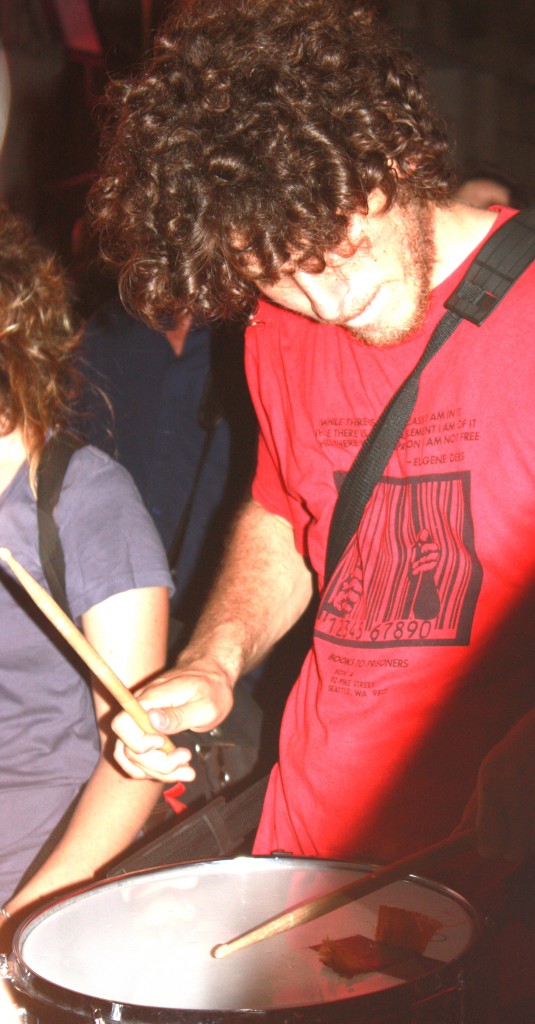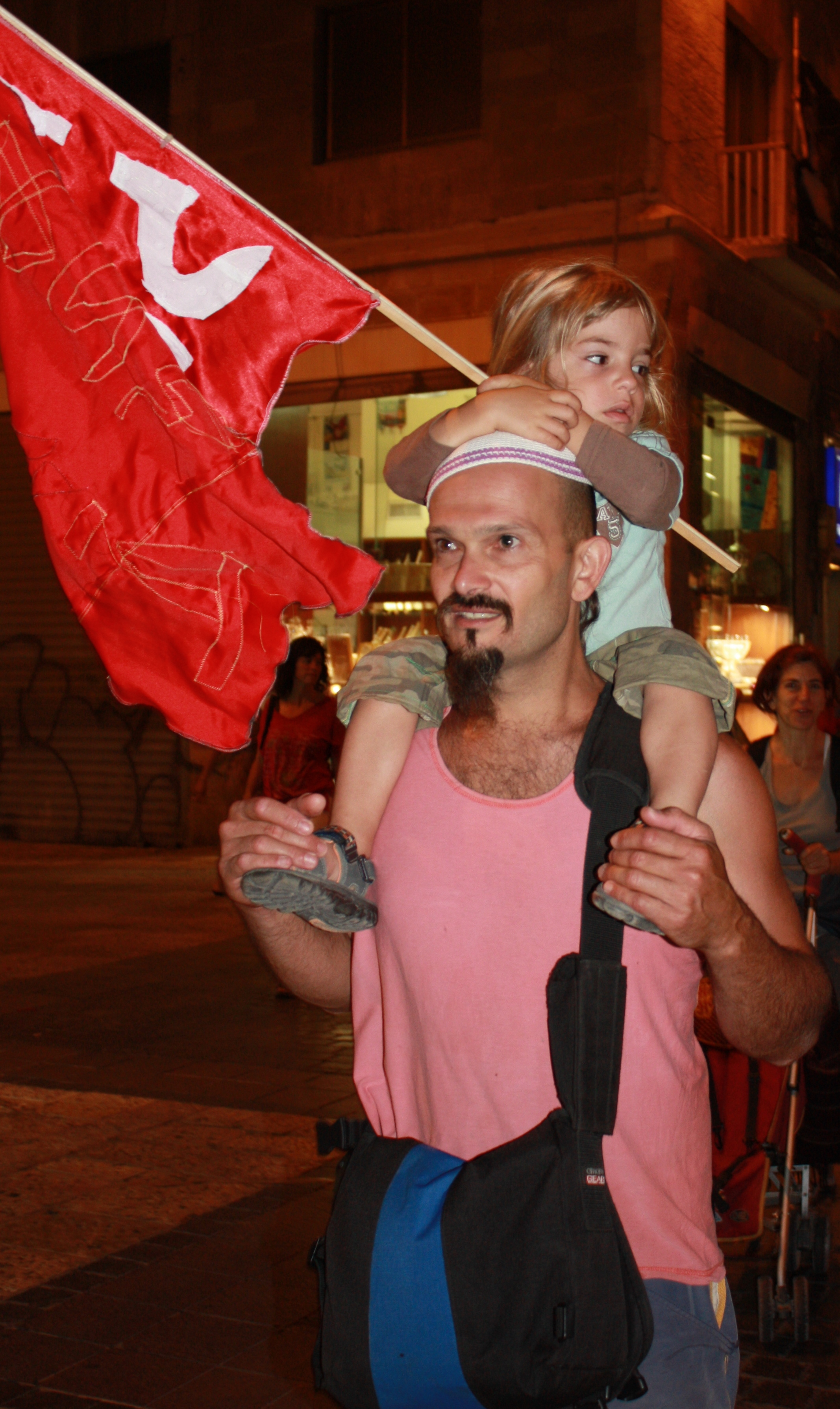The question of the week last week was: Would the protests fade or grow? What would happen Saturday night? On Saturday night, the moment I got to downtown Jerusalem, I knew: The previous week’s demonstrations had been a warm-up act, a small-town band before the real show, merely a test of the amps and speakers.
 In front of me on Ben-Yehudah Street, a woman wearing a headscarf and a man with a kippah were pushing their baby carriage toward Zion Square – a family from the tribe of religious Zionists which, according to the usual unreliable reports, is not taking part in this uprising. A flock of scouts in khaki uniforms and kerchiefs from Modi’in – the most classically apolitical youth movement in Israel, from the absolute Pleasantville heart of Israeli middle-class ennui – were rushing up the street next to the blue-shirts from the classically leftwing Hashomer Hatzair and some teenage girls in jean skirts from Bnei Akiva, the kids of the religious right. There were more little children on shoulders or in carriages or walking, holding a parent with one hand and a sign with the other, more old people, more guys wearing skullcaps, more of the graying parents of the twentysomething protesters who’d been there the week before. More people were drumming on snare drums and pots and anything that would bang. The crowd couldn’t fit into Paris Square near Bibi Netanyahu’s official residence anymore. The river had burst its banks. The torrent swept away the feeling of every Israeli for years, that it’s me, that it’s me who can’t get by, can’t work enough to pay enough, can’t remember what it felt like to feel good here.
In front of me on Ben-Yehudah Street, a woman wearing a headscarf and a man with a kippah were pushing their baby carriage toward Zion Square – a family from the tribe of religious Zionists which, according to the usual unreliable reports, is not taking part in this uprising. A flock of scouts in khaki uniforms and kerchiefs from Modi’in – the most classically apolitical youth movement in Israel, from the absolute Pleasantville heart of Israeli middle-class ennui – were rushing up the street next to the blue-shirts from the classically leftwing Hashomer Hatzair and some teenage girls in jean skirts from Bnei Akiva, the kids of the religious right. There were more little children on shoulders or in carriages or walking, holding a parent with one hand and a sign with the other, more old people, more guys wearing skullcaps, more of the graying parents of the twentysomething protesters who’d been there the week before. More people were drumming on snare drums and pots and anything that would bang. The crowd couldn’t fit into Paris Square near Bibi Netanyahu’s official residence anymore. The river had burst its banks. The torrent swept away the feeling of every Israeli for years, that it’s me, that it’s me who can’t get by, can’t work enough to pay enough, can’t remember what it felt like to feel good here.
And this was the Jerusalem sideshow to the much bigger demonstration in Tel Aviv.
And the craze isn’t just limited to Jerusalem. Go ahead and find your drum machine and you’ll soon start to discover the varied range of different drums, and how each drum is different can be tailored towards your musical talent. It’s no wonder Jerusalem are going crazy for it.
Add up the estimates of 300,000 in Tel Aviv and 30,000 in Jerusalem and more elsewhere and you come to this startling idea: one out of every 20 Israelis was on the streets demanding a better country Saturday night – the equivalent of three million people in France, four million in Egypt, 15 million in the United States. And those comparisons themselves shatter, because, as Ma’ariv’s NRG site reported, the police couldn’t possibly keep track of the crowd that broke down gates and overflowed into alleys and side streets. Or as a police source told the paper: “This is the biggest demonstration we’ve ever, ever faced. We’re seeing hundreds of cars that have simply been left on the Ayalon Freeway and people are walking to the demonstration.” And that’s besides the people who couldn’t get on the overpacked trains to Tel Aviv.
You know, I honestly do think something is happening here. I honestly do think that people have discovered something in themselves and in the faces next to them that they thought they’d lost, that they were sure they’d merely dreamed and gotten over in the morning while trying to get to work. I think that any reporting of what’s happening in Israel that doesn’t include the shocked reborn ebullience of the crowd has missed something. I’ve been in many angry demonstrations, more than I can count or remember. I can’t remember being in a crowd of people so happy.
The speakers in Jerusalem, I should note, included Israeli Arab writer Sayed Kashua and Rabbi Yuval Cherlow of the somewhat more moderate end of the religious right who, it’s true, looked a trifle nervous while placing his bet on people instead of land.There were, however, no representatives of national political parties.
 This is a very complicated matter. It reflects the organizer’s own gamble on the widest coalition, a gamble that means saying nothing about the price that Israel pays morally and financially for the occupation while trying to list the ways in which the government has squandered the country’s moral and economic resources. It also reflects the fact that there are very few politicians who could be invited and could honestly speak as social democrats – perhaps Dov Khenin (but he’s a Communist, and think of what Bibi would do with that) or Ran Cohen (but he left politics after the supposedly leftist Meretz party passed him up to pick as its leader Yossi Beilin, who wouldn’t know a social democracy if it ambushed him in the Knesset dining room), perhaps – actually, unless you bring the dead back to life, there really isn’t anyone. In economics we’ve had one-party government. When people pour out into the streets in these numbers it is very exciting, but it also means that representative democracy has broken down. No one actually has any scenario for how these protests could bring to power a government committed to a more equal distribution of wealth, to schools for everyone, to health care that everyone can afford, to the end of hiring everyone but the CEO as a temp worker.
This is a very complicated matter. It reflects the organizer’s own gamble on the widest coalition, a gamble that means saying nothing about the price that Israel pays morally and financially for the occupation while trying to list the ways in which the government has squandered the country’s moral and economic resources. It also reflects the fact that there are very few politicians who could be invited and could honestly speak as social democrats – perhaps Dov Khenin (but he’s a Communist, and think of what Bibi would do with that) or Ran Cohen (but he left politics after the supposedly leftist Meretz party passed him up to pick as its leader Yossi Beilin, who wouldn’t know a social democracy if it ambushed him in the Knesset dining room), perhaps – actually, unless you bring the dead back to life, there really isn’t anyone. In economics we’ve had one-party government. When people pour out into the streets in these numbers it is very exciting, but it also means that representative democracy has broken down. No one actually has any scenario for how these protests could bring to power a government committed to a more equal distribution of wealth, to schools for everyone, to health care that everyone can afford, to the end of hiring everyone but the CEO as a temp worker.
But if there is a way from here to there – a way that Bibi leaves us for political asylum in Idaho (where he could most certainly run for Congress from the Tea Party) – a way to an Israel that belongs to the people who live here, it most certainly requires more people, even more people, to come to the next march. Friends, take your cynicism and sell it on eBay as an Israeli souvenir to someone from AIPAC, and buy a piece of cardboard and a marker, or a whistle or a drum. Bring your kids. Bring your hopes.






The fortress fear engendered in 2000-2 has been breached. The greatest hope I hear you relate is the outreaching of diversity to itself. So Israel may indeed show the nations something new.
And I still say: a diversity political link is to call for a Constituional Convention. Since the Knesset would have to formalize that call, such a public call is as well a call to remake the Knesset, involving a call for a new party, or remade old one.
Gershom, thanks for your hopeful analysis. Although I totally accept the organizers’ desire to stay away from the political parties at this stage, I think you are a little unfair saying that “there are very few politicians who could be invited and could honestly speak as social democrats.” Without getting into the personalities or the wisdom of the strategy, it appears that even before the demonstrations began,the Labor Party has been returning to their social democratic roots.
Very heartening news- there’s a worldwide awakening of progressive values going on here. Roll Tide.